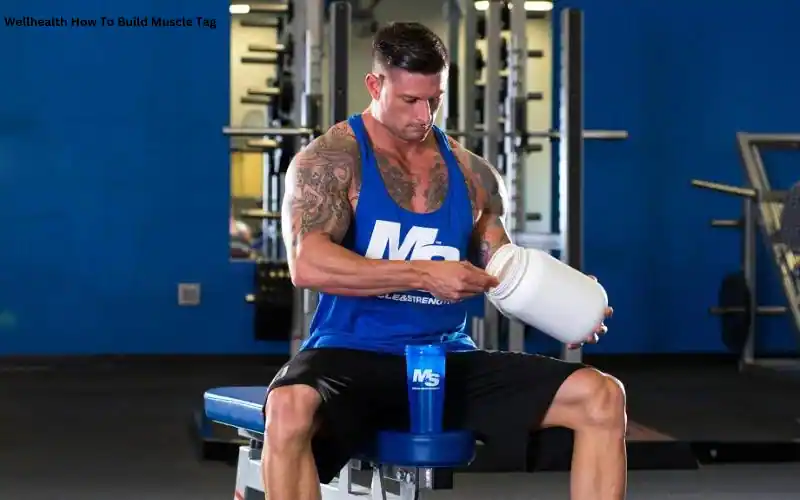Building muscle requires dedication and hard work. As an aspiring bodybuilder, you need to commit to a challenging workout regimen and diet to gain lean muscle mass. However, the rewards of improved strength, physique, and self-confidence make the effort worthwhile. This article provides an overview of the essential components required to build muscle effectively. You will learn the importance of progressively overloading your muscles through strength training, providing enough protein and calories to gain weight, getting adequate rest for recovery, and staying consistent with your routine. While building muscle is not easy, by following the guidance in this article you will have a roadmap to achieve your goals and experience the lifelong benefits of improved muscular fitness. Stay focused on your objectives and don’t get discouraged easily. You have the power to transform your body – now put in the work to make it happen.
Introduction to Building Muscle With Wellhealth
To build muscle with Wellhealth, follow these key steps:
Eat More Protein and Calories
Consume more protein and increase your calorie intake, especially from protein and carbs. Aim for 1 to 1.5 grams of protein per pound of body weight per day from sources like chicken, fish, lean meat, eggs, and dairy. Increase your calories, focusing on lean proteins, complex carbs, and healthy fats.
Lift Weights
Perform strength or resistance training with weights 2-4 times a week, with rest days in between for the best results. Focus on compound exercises like squats, deadlifts, bench press, pull ups, rows, overhead press, and lunges. Start with 2-4 sets of each exercise of 6-12 reps. Increase weight and decrease reps over time as your muscles strengthen.
Get Enough Rest
Muscle is built when you rest, not when you’re working out. Aim for 7 to 9 hours of sleep per night to allow your muscles to recover from intense exercise. Lack of sleep can sabotage your gains.
Consider Supplements
For some, supplements like protein powder, creatine, and pre-workout formulas can help boost your efforts. But the foundation for muscle gain is proper diet and exercise. Supplements are meant to supplement your regimen, not replace it.
Following these essential steps will put you well on your way to achieving your muscle building goals in a healthy, sustainable way with Wellhealth. Stay consistent and dedicated, and you’ll be gaining muscle in no time.
Key Nutrients for Muscle Growth
To build muscle, you need to consume key nutrients that provide the raw materials for muscle gain.
Protein
Protein is essential for muscle growth. Aim for 1 to 1.5 grams of protein per pound of body weight per day from sources like chicken, fish, lean meat, eggs, and legumes. Spread your protein intake throughout the day to optimize muscle building.
Carbohydrates
Carbohydrates provide the energy you need for intense weight training. Focus on complex carbohydrates from sources such as rice, oats, potatoes, and vegetables. For muscle gain, consume 2 to 3 grams of carbs per pound of body weight per day. Time your carb intake around your workouts.
Healthy Fats
Consume polyunsaturated and monounsaturated fats, such as olive oil, nuts, and avocados. Limit saturated fat from red meat and full-fat dairy. Healthy fats provide energy and help your body absorb nutrients. Aim for 0.5 to 0.9 grams of fat per pound of body weight per day.
Other Nutrients
Other important nutrients include:
- Creatine: Occurring naturally in meat and fish, creatine supplements can boost muscle gain. Follow the directions on the product packaging.
- BCAAs: Branched-chain amino acid supplements provide the building blocks for muscle. Look for a supplement with a 2:1:1 ratio of leucine, isoleucine and valine.
- Zinc and magnesium: These minerals play roles in protein synthesis and muscle function. Aim for the recommended daily amounts of 11 mg and 400 mg per day respectively.
Consuming the proper balance of these key nutrients will provide the fuel you need to gain muscle through consistent weight training and adequate rest. Be sure to also stay well hydrated to facilitate muscle recovery and growth. With the right diet and exercise plan, you’ll gain muscle in no time.
Effective Strength Training Exercises
To build muscle effectively, focus on strength training exercises that work all your major muscle groups.
Compound Exercises
Exercises that incorporate multiple joints and muscles, known as compound exercises, provide the most benefit. Examples include:
- Squats: Squats work your quadriceps, hamstrings and glutes. To do a squat, stand with feet shoulder-width apart, bend your knees and lower your hips until your thighs are parallel to the floor. Push back up to the starting position.
- Bench Press: The bench press works your pectorals, shoulders and triceps. Lie face up on a bench with a barbell above your chest. Lower the bar to the middle of your chest and then push back up.
- Pull Ups: Pull ups work your back, biceps and forearms. Grab a pull up bar with an overhand grip and hang from the bar with arms extended. Bend your elbows and pull your chin up to the bar by drawing your shoulder blades back and together. Slowly lower back down.
- Deadlifts: Deadlifts work your back, glutes, quadriceps and hamstrings. Stand with feet shoulder-width apart and grasp a barbell with an overhand grip. Bend your knees and lift with your legs and back to raise the bar to mid-thigh. Squeeze your glutes and hamstrings at the top, then slowly lower the bar back down.
Progressive Overload
To continue gaining strength and muscle, progressively increase the intensity of your workouts over time through progressive overload techniques:
- Increase weight: Once you can perform the target number of reps, increase the weight for your next set. Start with small increases of 5-10% of the total weight.
- Increase volume: Add an additional set of the exercise or additional exercises that work the same muscle group.
- Decrease rest periods: Take shorter rest periods between sets to increase intensity. Start with 60-90 seconds and decrease to 30-60 seconds over time.
- Increase frequency: Add an additional strength training session each week to work the same muscle groups. Increase from 2 times a week to 3 times a week, for example.
Applying these progressive overload techniques over the long-term will lead to continued gains in muscle and strength. Be consistent and patient, increasing intensity over weeks and months to keep making progress.
Lifestyle Tips for Maximizing Muscle Gains
To maximize your muscle gains, focus on these lifestyle tips:
Get Enough Sleep
Aim for 7 to 9 hours of sleep per night. Sleep is when your body releases growth hormone, which helps build muscle. Lack of sleep can decrease growth hormone and testosterone, hindering muscle gain.
Stay Hydrated
Drink plenty of water to stay hydrated. Dehydration leads to fatigue, decreased performance, and hindered muscle gain. Aim for 6 to 8 glasses per day as a rule of thumb. For every pound of body weight, drink half that number in ounces of water.
Eat More Protein
Consume 0.5 to 0.9 grams of protein per pound of body weight per day. Good sources include chicken, fish, lean meat, eggs, nuts, and dairy. Protein provides the amino acids your body needs to build muscle. Spread your protein intake throughout the day for maximum benefit.
Reduce Stress
Try meditation, yoga, or deep breathing to lower your stress levels. Cortisol, the stress hormone, can decrease testosterone levels and inhibit muscle gain when chronically elevated. Keeping stress in check will maximize your results.
Limit Alcohol Consumption
Restrict your alcohol intake, especially in the evenings after workouts. Alcohol decreases protein synthesis, testosterone, and growth hormone, all of which are important for muscle gain. Limit yourself to 1 drink per day or less.
Making healthy lifestyle changes and staying consistent with good habits will help you get the most out of your muscle-building efforts. Getting enough rest, staying hydrated, eating plenty of protein, reducing stress, and limiting alcohol are all things within your control that can significantly impact your results. Focus on progress over perfection and make changes at your own pace. Every small improvement will help maximize your muscle gains over the long run.
Wellhealth Supplements for Muscle Building
To build muscle effectively, a proper diet and exercise regimen is essential. In addition to these fundamentals, certain supplements may aid in muscle protein synthesis and overall gains. Two of the most well-researched options are creatine and branched-chain amino acids (BCAAs).
Creatine is one of the most popular muscle-building supplements. It is an amino acid compound found naturally in the body that provides energy for muscle contractions. Supplementing with creatine, typically 3-5 grams per day, has been shown to increase muscle size and strength. Creatine leads to cell volumization, drawing water into muscle cells and enhancing protein synthesis.
BCAAs, especially leucine, are important for muscle protein synthesis. BCAA supplements, taken before and after workouts, provide the amino acids needed to build new muscle proteins. A daily dose of 3-5 grams of BCAAs has been shown to decrease muscle breakdown and increase muscle growth over time. BCAAs may be particularly useful when training in a fasted state.
In addition to creatine and BCAAs, a few other supplements may provide benefit for those looking to gain muscle:
•Whey protein powder: A convenient way to increase your daily protein intake, which should be 0.5-0.9 grams per pound of body weight per day for muscle gain.
•Beta-alanine: An amino acid that can enhance muscle endurance and potentially increase muscle gain over time when taken in doses of 2-5 grams per day.
•Citrulline malate: An amino acid compound that may increase blood flow to muscles, improve performance, and stimulate muscle protein synthesis in doses of 6-8 grams per day.
•Zinc and magnesium: Important minerals that can influence muscle health and anabolic hormone levels. Aim for the recommended daily amounts of each to optimize muscle gain.
When combined with a sound diet and training plan, certain supplements may provide a small boost in your muscle-building efforts. However, supplements are not substitutes for the fundamentals and will not produce gains on their own. Consistency and dedication over the long-term are key to achieving your muscle-building goals.
Conclusion
So there you have it—the keys to building muscle and gaining strength. Consistency, dedication, and determination will serve you well on your muscle-building journey. Follow a proven workout plan, focus on progressive overload, get enough protein and calories to gain muscle, stay hydrated, and get enough rest. Remember, gaining muscle is a marathon, not a sprint. Don’t get discouraged if you don’t see results right away. Stay dedicated, stick to the fundamentals, and you’ll achieve your goals over time through consistent effort and commitment. Building muscle requires hard work and dedication, but the rewards of strength, improved body composition, and confidence are well worth it. You’ve got this! Now get to work and start building muscle.



